|
|
|
This beautiful building is often nicknamed Pink Mosque for two reasons. The Nasir al Mulk mosque was built in the center of Iran’s Shiraz, where the conditions for growing roses are excellent so there really are many. Another reason is the pink mosaic tile, which is supposed to resemble the sunrise and sunset. Perhaps the most beautiful is the interior windows, which contain colorful stained glass. Each of them is decorated with the completely different motif. The most impressive are the windows on the east side. If you plan your visit properly and arrive here in the morning just after sunrise, you will be able to admire the beautiful splashes of colors and lights on the walls of the mosque.. |
|
Two years ago, the World Health Organization named Tabriz as the healthiest and most hygienic city in Iran.
For a third consecutive year, the northwestern city of Tabriz has been introduced as the best Iranian city to live in.
According to studies by the United Nations about different cities across the world published in an online magazine, Tabriz is the most beautiful and developed Iranian city followed by Tehran, Isfahan, Mashhad, Shiraz, Qom and Orumiyeh.
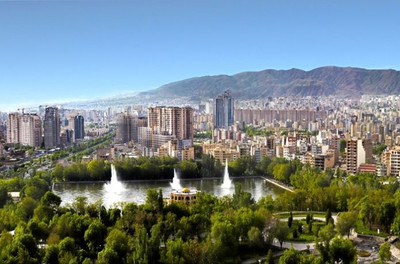 Fars News Agency filed a report on October 12 on the designation of Tabriz as the best Iranian city. The translation of part of the report is as follows:
Among other things, the number of modern and beautiful buildings, developed airlines, attractive pristine nature, delicious food, beautiful mosques and historical sites
...
Read more »
Fars News Agency filed a report on October 12 on the designation of Tabriz as the best Iranian city. The translation of part of the report is as follows:
Among other things, the number of modern and beautiful buildings, developed airlines, attractive pristine nature, delicious food, beautiful mosques and historical sites
...
Read more »
|
|
Amir Chakhmaq Complex is very interesting and it stands on the square with the same name. It is known for its three-story building. Each floor is decorated with perfectly spaced alcoves of round shape. In the middle of the main building, there are two slender minarets standing upright.
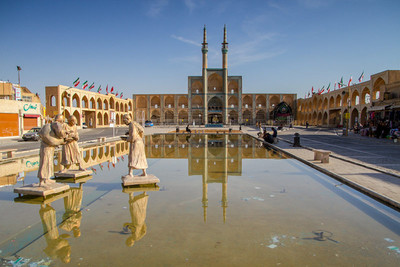 However, only the first floor of the Mosque is accessible. The building is the most beautiful during sunset when the alcoves are lit by the pink glow of the sun, creating breathtaking plays of color and light on the facade of the building. Evening visitors will be thrilled as well, as they will be able to admire the romantic square with magically lit fountain and the Amir Chakhmaq mosque in the background.
...
Read more »
However, only the first floor of the Mosque is accessible. The building is the most beautiful during sunset when the alcoves are lit by the pink glow of the sun, creating breathtaking plays of color and light on the facade of the building. Evening visitors will be thrilled as well, as they will be able to admire the romantic square with magically lit fountain and the Amir Chakhmaq mosque in the background.
...
Read more »
|
|
This reddish village is one of the most popular places in Iran. Historians believe it was founded more than 2,000 years ago. This unique place is, in fact, a living museum where time has stopped. Every visitor can admire the beauty of the ancient village, where people still live today. The houses are built with red clay with richly carved doors, which are decorated with two different knockers, one for women and the other for men. The picturesque village is surrounded by mountains that are usually covered by snow in winter and so the visitor can enjoy a magnificent view of the red village in the grip of white snow-covered mountains.
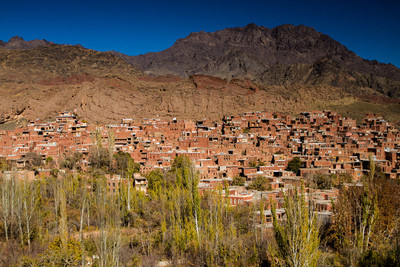 View of a thousands years old village in the mountains
It hasn’t been clear yet how long the local people can live in these difficult conditions. Mos
...
Read more »
View of a thousands years old village in the mountains
It hasn’t been clear yet how long the local people can live in these difficult conditions. Mos
...
Read more »
|
|
The extensive Katale Khor cave system, rated by locals as the best in western Iran, is 150km south of Zanjan, off the Soltaniyeh–Hamadan road near Garmab. Less touristed than the more famous Ali Sadr caves, which it is thought to eventually join, Katale Khor has 3km open to the public and another 4km available for experienced cavers. There are six recorded levels and a visit takes one to two hours. There's no public transport to the site; hire a taxi.
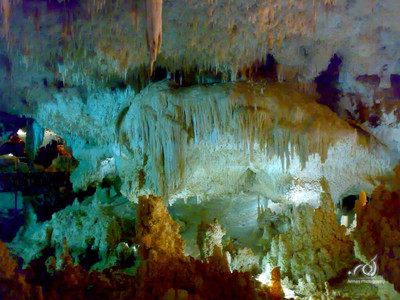 The easiest approach is to hire a taxi for the day from Zanjan (US$70) and combine it with a visit to Soltaniyeh and the tomb of Ghydar Nabi in Ghydar (Qeydar), either returning to Zanjan or continuing on to Hamadan. Alternatively, take a savari to Soltaniyeh and another to Ghydar, and hire a taxi from there (unless you find a sav
...
Read more »
The easiest approach is to hire a taxi for the day from Zanjan (US$70) and combine it with a visit to Soltaniyeh and the tomb of Ghydar Nabi in Ghydar (Qeydar), either returning to Zanjan or continuing on to Hamadan. Alternatively, take a savari to Soltaniyeh and another to Ghydar, and hire a taxi from there (unless you find a sav
...
Read more »
|
|
This massive river-cave system 70km north of Hamadan is normally visited as a day trip.
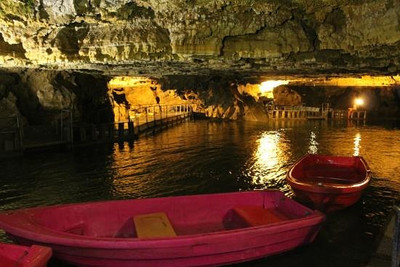 It's popular with Iranian tourists, but foreigners usually have mixed feelings, most stemming from the cost (10 times what locals pay) and the perceived commercialisation. However, traversing darkened caverns by paddle boat and walking across subterranean islands is pretty special. Treat it as a cultural experience as well as a scenic one. A tour takes 45 to 90 minutes. Avoid (crowded) weekends and tip your guide.
It's popular with Iranian tourists, but foreigners usually have mixed feelings, most stemming from the cost (10 times what locals pay) and the perceived commercialisation. However, traversing darkened caverns by paddle boat and walking across subterranean islands is pretty special. Treat it as a cultural experience as well as a scenic one. A tour takes 45 to 90 minutes. Avoid (crowded) weekends and tip your guide.
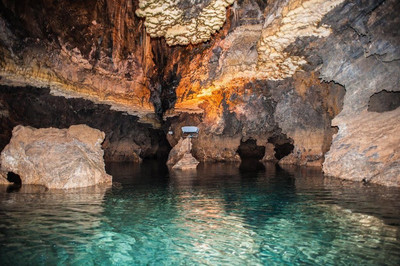 Ignore the sign saying '$25' and insist on paying in rial – it will w
...
Read more »
Ignore the sign saying '$25' and insist on paying in rial – it will w
...
Read more »
|
|
PERSEPOLIS WAS ONCE THE RICHEST city on earth - the glittering capital of the Achaemenid Empire. At the heart of the city lay the royal palace - a wonder of gold and silver, ivory, and precious stones. From there, Xerxes planned his war against Greece - and the treasure of a vast empire piled up in the store-rooms.
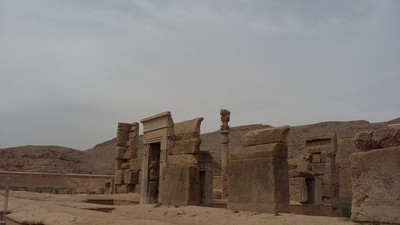 In 330 BCE, Persepolis was captured by Alexander the Great. Before he left the city, he ordered the palace burned to the ground - whether through drunken malice or sober calculation, it is impossible to be sure. Today, the haunting, spectacular ruins of Persepolis reveal both the glory of the Achaemenid Empire, and the abruptness of its passing. The palace is still marked by Alexander’s fire: three feet of ash covered the floor in some places when it was first excavat
...
Read more »
In 330 BCE, Persepolis was captured by Alexander the Great. Before he left the city, he ordered the palace burned to the ground - whether through drunken malice or sober calculation, it is impossible to be sure. Today, the haunting, spectacular ruins of Persepolis reveal both the glory of the Achaemenid Empire, and the abruptness of its passing. The palace is still marked by Alexander’s fire: three feet of ash covered the floor in some places when it was first excavat
...
Read more »
|
|
JUST NORTH OF KASHAN, IN the small town of Nushabad, Iran (also spelled Noosh Abad), lies a sprawling underground city. Despite its impressive scale, the ancient buried shelter was completely unknown until a decade ago, when an oblivious resident stumbled upon a tunnel while digging a sewage ditch in his home.
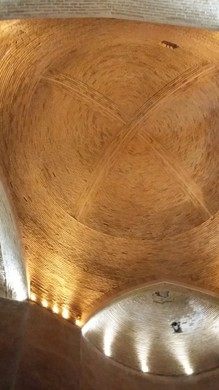 What was discovered was an extensive, 1,500-year-old underground city, set between 3 to 18 meters (10 to 60 feet) deep. The labyrinthine network was comprised of three stories of tunnels, chambers, air ducts, staircases, canals, and booby traps. It’s considered a marvel of ancient architecture and engineering.
Construction of this man-made subterranean city, called Ouee (or Ouyi), dates back to the Sasanian (or Neo-Persian) Empire that ruled from 224 to 651. Inhabitants would dig underground chambers as hideout spots for women, children, and the elderly in the event of an atta
...
Read more »
What was discovered was an extensive, 1,500-year-old underground city, set between 3 to 18 meters (10 to 60 feet) deep. The labyrinthine network was comprised of three stories of tunnels, chambers, air ducts, staircases, canals, and booby traps. It’s considered a marvel of ancient architecture and engineering.
Construction of this man-made subterranean city, called Ouee (or Ouyi), dates back to the Sasanian (or Neo-Persian) Empire that ruled from 224 to 651. Inhabitants would dig underground chambers as hideout spots for women, children, and the elderly in the event of an atta
...
Read more »
|
|
Guilan Grand Restaurant located in Golsar, Rasht is a modern restaurant in the heart of Rasht. Its internal design consists of dark brown wooden floors, light brown brick walls, wooden tongue-and-groove, cedar ceilings and is furnished with black leather sofas, wooden chairs and black lamps.
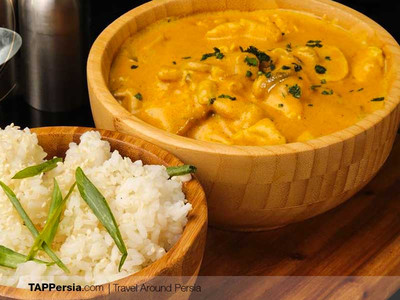 Grand restaurant’s menu is quite considerable. They serve all kinds of Kebabs and northern traditional foods, along with different kinds of sushi, steak and other international items. We recommend their shrimp and avocado salad which contains poached shrimps, thin cucumber rolls, lettuce and avocado, garnished with a special house dressing and sesame seeds. For refreshments, try their nutritious lemon-ginger drink, designed with mint, lemon slices and sliced ginger.
Vavij is another delicio
...
Read more »
Grand restaurant’s menu is quite considerable. They serve all kinds of Kebabs and northern traditional foods, along with different kinds of sushi, steak and other international items. We recommend their shrimp and avocado salad which contains poached shrimps, thin cucumber rolls, lettuce and avocado, garnished with a special house dressing and sesame seeds. For refreshments, try their nutritious lemon-ginger drink, designed with mint, lemon slices and sliced ginger.
Vavij is another delicio
...
Read more »
|